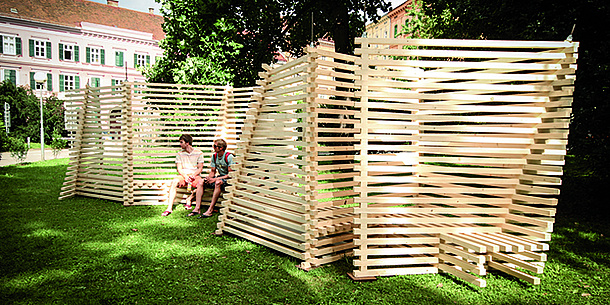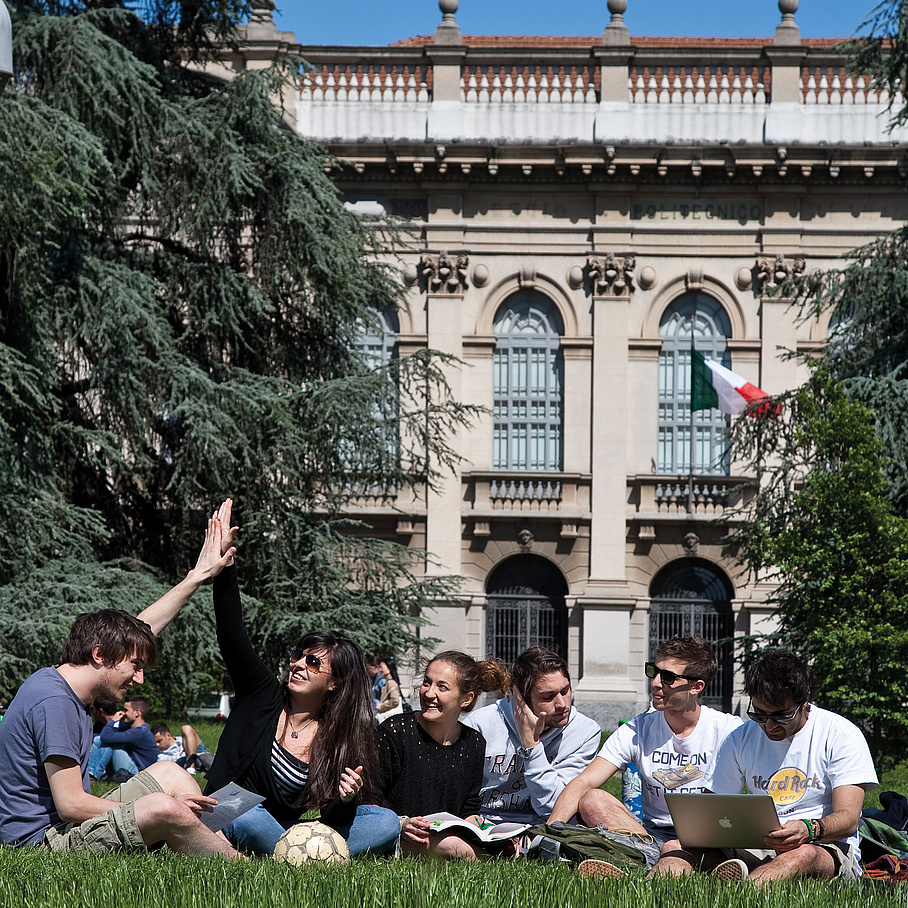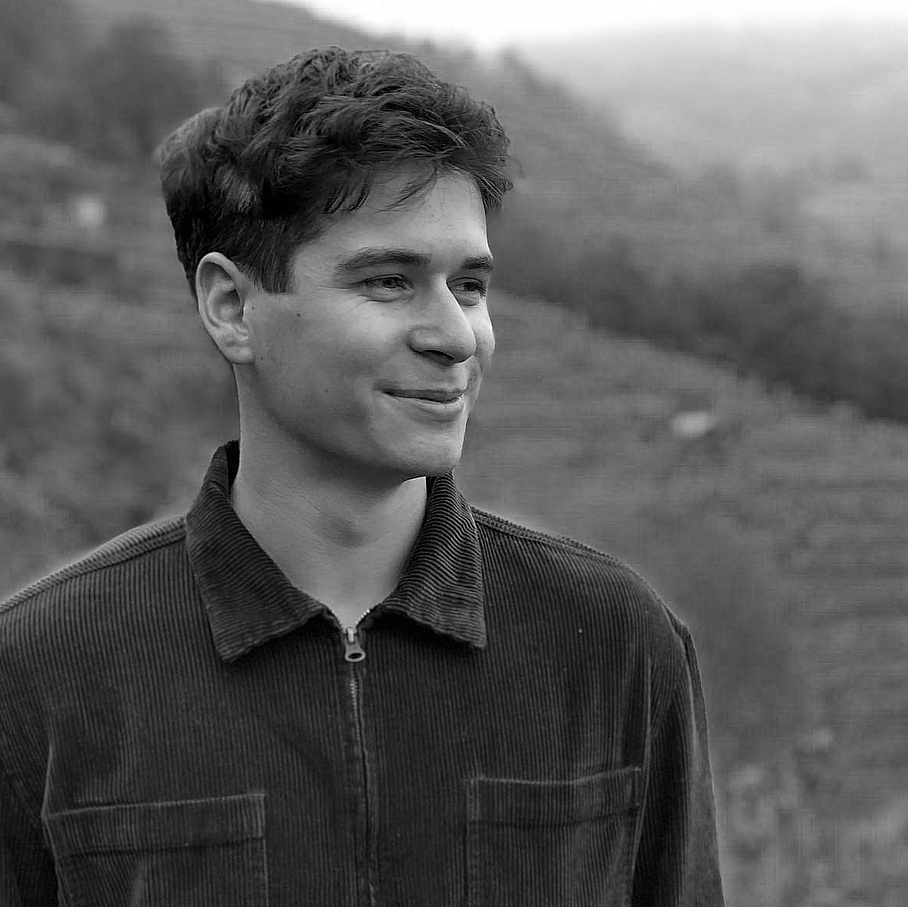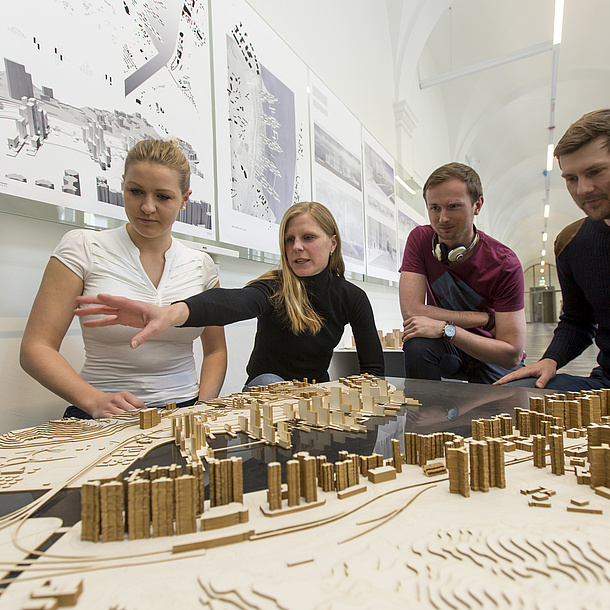Quick Facts
- Duration of study: 4 semesters
- ECTS credit points: 120
- Academic degree: "Diplom-Ingenieurin" or "Diplom-Ingenieur" ("Dipl.Ing". or "DI"), equivalent to the Master of Science (MSc)
- Language of instruction: German
The Master's Programme
In the Master's degree programme in Architecture, you will learn how to tackle a broad diversity of design work confidently by carrying out research. The exact programme content can largely be chosen freely from the first semester and onwards. Project exercises carried out in so-called ‘studios’ serve as an important learning tool: Just as in architectural offices, an emphasis is placed on focused work in close communication with others. The topics addressed in the individual studios range from urban landscapes, the developed cultural landscape, the region and the city and on to individual building types and minute details of construction, representation and space. You will learn how to:
- independently create and apply architectural designs,
- represent designs in two- and three-dimensional space using analogue and digital methods,
- use economic, ecological and architectural resources responsibly,
- gather a comprehensive knowledge of materials,
- master economic and organizational processes in the construction workflow and project planning,
- develop complex architectural projects with other students, and
- present architectural projects in a professional manner.
The combination of compulsory project exercises, freely selectable specialisations and supplementary electives enables you to to design your studies according to your own interests. The final master's thesis, completed in the 4th semester, can also be assigned to an elective.
Students benefit from the excellent ratio of supervision – as compared to the rest of Europe – which supports individual exchange between students and lecturers in the design courses. Master's students have access to numerous workspaces on campus.
Focus Areas
The content covers the central topics of design, construction, history and theory as well as presentation and communication. You can choose these according to your own interests and professional plans. The individual focus topics encompass a total of 150 electives to choose from. This extremely diverse range, which covers all important areas of architecture, includes:
Design: design practices, design theory, applied methods in architectural design, design of tall and extensive support structures, regional and inter-regional spatial planning, typological transformation as an architectural task, etc.
Construction: engineering and design, materials and technology, computer simulation, advanced façade technologies, advanced building systems, fire protection and infrastructure, etc.
History: history of architecture, monuments preservation, history of planning, reconstruction of ancient buildings, etc.
Theory: architectural theory today, space perception, ecological design, sustainable systems, contemporary art and architecture, non-European building cultures, gender studies and space, sociology for architects, etc.
Representation and Communication: information visualization, architectural visualization, communication and coaching, visual and sonic practices, etc.

In the Master's degree programme in Architecture at TU Graz, the sustainable and creative design of living spaces is an essential part of the training.
Collaborations and Networks
Graz is one of UNESCO Cities of Design. The traditionally strong architectural scene in Graz played a significant role in integrating Graz into UNESCO’s global "Creative Cities Network".
In recent years, architects who are on the verge of making an international breakthrough and who would like to share their knowledge have been increasingly attracted to the Faculty of Architecture at TU Graz. As a small and rapidly changing school, we provide an interesting environment for guest lecturers, and our students also demonstrate a high standard in international comparisons.
Our master’s students move within the dense environment of architectural offices in the city of Graz to gain practical experience. A close connection also exists with other architecture-related institutions in the city, such as the House of Architecture, the "Forum Stadtpark" and the Central Association of Architects.
However, the nucleus of creative, design networking is found in the Architecture Drawing Studios at TU Graz. These represent the starting point for exciting cultural initiatives. Students see the drafting rooms as a central component in the development of their individual architectural personalities.
Admission
1. Admission Procedure
Graduates of the Bachelor's Degree Programme in Architecture at TU Graz are admitted without needing to fulfil further requirements. Admission without conditions is also possible for graduates of the following Bachelor's degree programmes:
- Architecture, TU Wien
- Architecture, University of Innsbruck
- Architecture, TU München
- Architecture, TU Darmstadt
- Architecture, Politecnico di Milano
- Architecture, Tongji University Shanghai
Graduates of other bachelor's degree programmes can obtain information and apply for admission by contacting study@tugraz.at.
2. Admission
- Admission and deadlines for Austrian students who are beginning their studies at TU Graz for the first time
- Admission and deadlines for international students
- If you are or were already admitted to a degree programme at TU Graz, please come to the TU Graz Registrar’s Office in person during the admission period or contact study@tugraz.at.
Fragen zur Zulassung?
Contact study@tugraz.at
Double Degree Programme
As part of the master's degree programme, you can complete a Double Degree Programme with Politecnico di Milano (Italy). You study both at TU Graz and Politecnico di Milano and receive a degree from both universities.
Study at two Universities
Unlike the normal master's programme curriculum, the Double Degree Programme comprises 150 ECTS credits. You have to complete two project exercises at TU Graz and two project exercises at Politecnico di Milano, plus the corresponding compulsory electives. You will write your master's thesis in English under the supervision of a supervisor both at TU Graz and at Politecnico di Milano.
For more information, see the curriculum supplement (in German).


The time at the Politecnico di Milano was a great enrichment for me, both academically and personally. Due to the international reputation of the Politecnico, students and teaching staff show a high level of cultural diversity and competitiveness, which inevitably leaves its mark. The Double Degree Programme is a great opportunity to broaden your horizons and benefit from a world-class university.
Consultation on the Double Degree Programme
On courses and content
Daniel GETHMANN
Assoc.Prof. Mag.art. Dr.phil.
Institute of Architectural Theory, History of Art and Cultural Studies
daniel.gethmann@tugraz.at
On the mobility scholarship
Manuel AUSSERLECHNER
MA
International Office
manuel.ausserlechner@tugraz.at
Career Prospects
Professional Fields
In today's complex social environment, the profession of architecture demands strong personalities who have benefited from a solid design, technical and cultural education. As an architect, you will work in architectural and planning offices, the construction industry, construction and project management, or the creative industries.
- You develop architectural designs for new buildings or renovations and turn them into reality.
- You plan living spaces in cities and communities.
- You coordinate development and construction projects.
- You advise and plan construction projects as civil engineers.
- You develop visualizations that are used in new media, exhibition design, communication, or graphics.
Acquire AI skills: AIE Extension Programme
Increase your career prospects with the Artificial Intelligence Engineering (AIE) extension programme and learn essential skills in AI development and application during or after completing your Master's degree.



